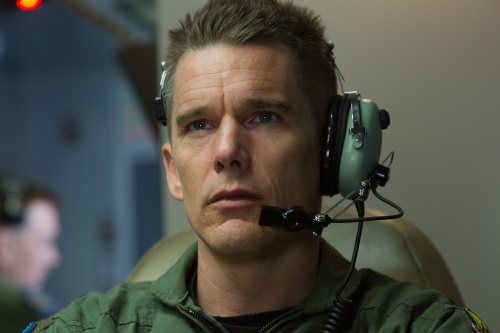
Ethan Hawke’s haunting portrayal of a US Army drone pilot in Good Kill highlights the moral, emotional and psychological traps of consenting to be a warrior.
He leads a double life, one in which he murders Afghanis remotely from the comfort of a protected facility outside Las Vegas and the other trying to live with himself and his family that hasn’t a clue what he does.
He is in a bad place, bedevilled by the weight of his actions and questioning American political sovereignty. Is he doing wrong? Is he creating new terrorists?
Hawke spent time with drone pilots to prepare for the role and we had the chance to ask him what he learned during a conversation in Toronto.

He said: “Drone pilots are having PTSD (Post traumatic stress disorder) because theirs is a life or death job. If they go to a doctor, they would have a huge sense of shame.
“They’re alone, their friends have lost limbs, there is a warrior’s mentality, no matter what I did I put my life on the line for my conviction but when your life is not on the line, taking a life it makes you feel like an assassin.”
M&C: He is an assassin. People go in to the job know and what’s expected. And his wife’s attitude about it is that she’s more interested in the marriage, and doesn’t give a lot of thought to what he’s doing.
EH: I have to respond to the first thing. Part of being an adult is being allowed to have a discerning mind. You’re absolutely right, my brother’s in the military and he’d say my character is asking questions he shouldn’t be asking. But at the same time we’re all very damning of people who follow orders and do unethical things.

M&C: That’s the entire military.
EH: That’s why they don’t support these kinds of movies. But it is still individuals that make up the army. A soldier doesn’t see the humanity in agreeing to fight for the country. This is the particular soldier we’re talking about who just wanted to fly jets. What’s robbing him of his self-esteem is that he is not in danger. He has no skin in the game, as he says. It’s dangerous to fly over Afghanistan. And those things aren’t happening anymore so he’s asking questions about what he’s doing in ways he’s never asked before and that’s making him crazy. And to not understand that – they’re not robots they’re people. His wife’s anger comes out of ignorance; she doesn’t know what he’s doing because he’s deliberately keeping it from her. She’s just lashing out that he’s not there. He’s emotionally unavailable that’s all she wants. 
M&C: He is certainly feeling guilt about what he’s doing.
EH: When the kids are home and school and Tommy’s looking up, he knows he loves his family and he knows that he’s taking people away from their families and he knows he’s trying to stop terrorism but he’s starting to figure out he’s terrorizing someone else. It’s an interesting thing to take in. Can you imagine? One of my favourite moments is when he comes home and he says “I did something good today”. And she says “don’t you always?” She’s says “You signed up for the military you’re keeping America safe”. He’s just not feeling good about it anymore. 
M&C: Tom, your character, is so quiet and internalized. Did you find drone pilots were like that?
EH: They were much more silent than I could ever pretend to be. It’s one of the things I realised. It was very difficult for me to do such a non-verbal part. It was really challenging for me. One of the things I realised that they are serious and it’s an accurate portrait. I can imagine being their wife is very difficult getting intimacy. I couldn’t do it the way they were because the movie would be so boring. 
M&C: There is a moment when kids in a convenience store ask him if his military I.D. is real, just after he wipes out unwitting Afghanis 7.5k miles away.
EH: I think that scene exemplifies the movie, the essence of the movie, because people don’t know. Most people have no idea, you’ll read the paper and see there has been a drone strike and you’ll see a crater in the ground but you don’t know how the crater got there really. Unless you see the imagery in this movie and understand the protocol. It’s surprising. I educated myself in the making of the movie. 
M&C: Did you take the character with you?
EH: That’s probably why I understand these guys. My situation isn’t nearly as serious as theirs but I completely understand that. It’s very difficult. You trick your body into thinking this stuff is real. That’s the trick. You internalise someone chewing themselves out from the inside during the day and you can’t tune it out. Your body just keeps doing it. You try to trick your brain into that mindset of hating yourself.
M&C: How did you find people who would speak openly about it?
EH: Not very many people know about it. Andrew got technical advisors who would tell us if you could or couldn’t do certain things. I asked “Can you use your cell phone, call your wife?” and they said “You are not allowed to”. “Would you?” “You are not allowed to”. He’s hiding his texting from his commander. We all do that.